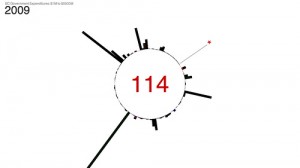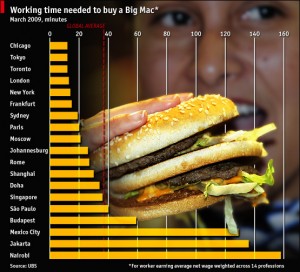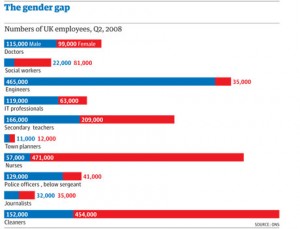Anti poverty advocates often have difficulty getting their points across. A new campaign in Hamilton called Do the Math has developed an interesting collaborative strategy to do just that! The Spec explains the process in this article Does $572 a month cover basic needs?. The following photo explains it all!
I like data and think it should be shared at not cost! Especially public data!
as in comprehensible is difficult. This morning I was looking at a few of my favourite blogs and in Flowing Data came across a great multimedia educational site that uses multimedia to impart the idea of scale and cells. Wonderfully simple.
Citizen science is a great way to gather data for research. In this case a tool called ISpot facilitated the indentification of a moth found by citizen scientist.
I read this article this morning in the UK Independent about a young girl who found a moth on her windowsill. Her dad subsequently took a picture of it and posted it on ISpot. It was a new discovery for the UK but not a new species which was identified within 24 hours by an Open University expert.
The Moth was later added to the Natural History Museum‘s collection. Seems like this young girl is quite a nature enthusiast who was inspired to start visiting the museum.
Martin Harvey, a researcher at the Open University’s Biodiversity Observatory, who identified the moth, said: “Katie’s find demonstrates the power of the internet, and iSpot in particular, in helping everyone learn about wildlife.
Wonderful!
Public sector information (PSI) aka government data access and sharing is culturally different than the sharing of data between and among scientists. And within science there are many different subgroups that have different takes on data sharing. This is also true when it comes to data preservation and archiving, and the consideration that all of these datasets are cultural heritage and national assets. One could argue that science data are also PSI or government data since most science is paid for with public research dollars. There is of course foundation money as well, and these too have a different data sharing culture.
The Online September issue of Nature is dedicated to the topic of data sharing in the sciences. Note, that does not necessarily include geomatics data, and yes folks, again a different data sharing culture.
Bref – different information ecologies and attention structures dictate how members of data creator communities do things.
The Government of Canada is soliciting feedback from Citizens on Copyright. The questions being asked are as follows:
1. How do Canada’s copyright laws affect you? How should existing laws be modernized?
2. Based on Canadian values and interests, how should copyright changes be made in order to withstand the test of time
3. What sorts of copyright changes do you believe would best foster innovation and creativity in Canada?
4. What sorts of copyright changes do you believe would best foster competition and investment in Canada?
5. What kinds of changes would best position Canada as a leader in the global, digital economy?
Please take a few minutes to comment as part of the Copyright Consultations.
The most efficient way to do this is a formal written submissions.. You can submit by sending an email to
- info@copyrightconsultation.gc.ca
. You can read all the submissions posted here. (see the right side of the Copyright Consultation Site).
The consultations will run until Midnight Sunday, September 13, 2009, so make sure your contributions are submitted before then.
For the curious, a draft submission by a CivicAccess.ca list member can be found at is Copyright 2009. He welcoms feedback and he also states:
Please grab anything you want from my submission towards your own.
Looks like a motion has been drafted for Open Data in the City of Calgary. City of Nanaimo has made some data accessible on its site. This is only a small sample and hopefully there will be more.
Tags: OpenData
Last night I attended the Town Hall Discussion on The Future of the Internet: Access, Openness and Inclusion. There was a hint from the moderator Marita Moll that Industry Canada as part of its Broadband Program might be releasing a map of Canadian broadband. There has been some interesting discussion in the US about access to broadband data at Off the Map and a podcast at All Points Blog. An E-Scan report has been done in Ontario on possibilities for the development of a Broadband Atlas for Ontarians. In all cases access to infrastructure data are highlighted as barriers, particularly as infrastructure has increasingly become privatized and splintered.
The UK Guardian has published data associated with an analysis of the employment sex gap. These data have re-affirmed my observations: technology (geomatics, computer science, IT, etc.) conferences = boys, social policy (homelessness, poverty, child abuse, etc.) conferences = girls. If we looked at the salary data associated with these professions, we would see a greater gap. If we played with more data, we could interpolate social status and political influence, and I speculate a greater gap still. Most interesting since many of our biggest challenges are social and not technical, but alas we value it less in terms of remuneration, status and power. I would tell you the Canadians story with data, but alas, these are too expensive to purchase from Statistics Canada.




Comments on Posts